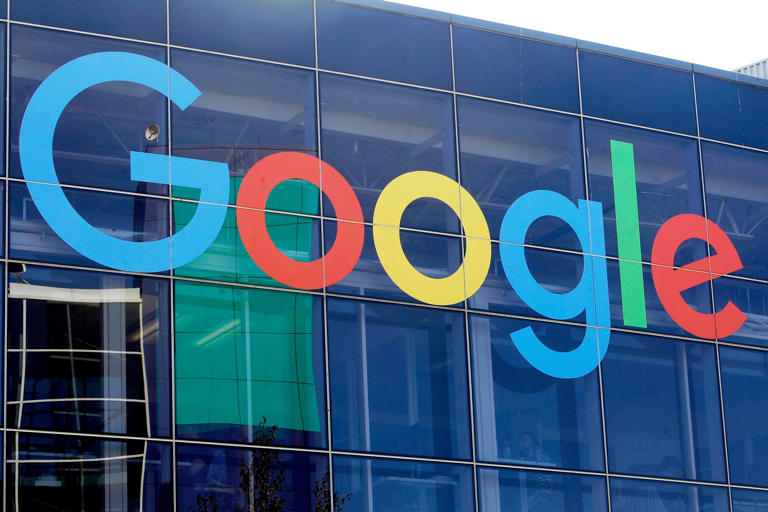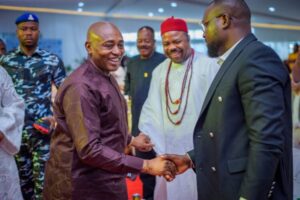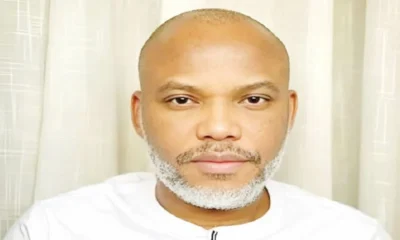Tech
TikTok shuts down in the United States hours ahead of a ban

TikTok went offline in the United States Saturday night, less than two hours before a ban was slated to go into effect. The extraordinary blackout prevents access to one of the world’s most popular social media apps – one that had been used by 170 million Americans.
Visitors to the app were met with a message reading: “Sorry, TikTok isn’t available right now. A law banning TikTok has been enacted in the U.S. Unfortunately, that means you can’t use TikTok for now.”
TikTok’s action comes after the Supreme Court on Friday upheld a ban that was passed with broad bipartisan support in Congress and signed into law in April by President Joe Biden. The law prevents American companies from hosting or serving content for the Chinese-owned social media platform unless it sells itself to a buyer from the United States or one of its allies.
But TikTok may not be gone for long. The company suggested it could be back soon – perhaps as early as Monday.
“We are fortunate that President Trump has indicated that he will work with us on a solution to reinstate TikTok once he takes office,” the company posted in its pop-up message to users who opened the app beginning late Saturday night. “Please stay tuned!”
President-elect Trump said he will “most likely” delay a ban on TikTok for 90 days after he takes office on Monday, adding that he has not made a final decision in a phone interview with NBC Newson Saturday.
“I think that would be, certainly, an option that we look at. The 90-day extension is something that will be most likely done, because it’s appropriate. You know, it’s appropriate. We have to look at it carefully. It’s a very big situation,” Trump said in the interview.
“If I decide to do that, I’ll probably announce it on Monday,” he added.
The blackout from TikTok — and the suggestion that it could soon restore its service — is the latest twist in a saga that’s dragged on for months, leaving the fate of the app in limbo.
The app also has disappeared from Apple’s App Store and the Google Play store. And other apps owned by TikTok’s parent company, ByteDance – including CapCut – also displayed a similar message Saturday night.
Lawmakers said TikTok’s ties to China and its access to reams of data posed a threat to national security.
Many US users told CNN they were bracing for an end to the app, including influencers and other small businesses that said they depended on the platform for a living. Still, they said, they held out hope the app would somehow be saved.
But the Supreme Court’s decision dashed hopes of a last-second judicial assist.
Some of the companies that operate app stores and run computer servers are said to be concerned that they will be held liable for violating terms of the ban. Those service providers pledged to stop carrying the app to avoid legal consequences, a person familiar with companies’ discussions told CNN.
Meanwhile, Trump — who first warned of TikTok’s dangers five years ago — is now casting himself as the app’s savior. Earlier this month, on his Truth Social account, he posted stats about his own popularity on TikTok and asked, “Why would I want to get rid of TikTok?”
TikTok’s CEO Shou Chew has met with Trump at his Mar-a-Lago home in the weeks leading up to the ban taking effect and is expected to attend Trump’s inauguration on Monday.
TikTok did not immediately respond to a request for comment late on Saturday.
A 90-day extension?
The law passed last year allows the president to delay the ban from going into effect by 90 days but requires evidence that parties working to arrange a sale of TikTok to a US-owned company have made significant progress.
But TikTok’s owner, ByteDance, has rejected would-be buyers. The company has cited its popularity among American users, and its value to small businesses across the country, as it fights to stay online without any change in ownership.
After the Supreme Court ruled, 9-0, to uphold the ban, White House press secretary Karine Jean-Pierre signaled the administration wouldn’t enforce the law on Biden’s final day in office.
Due to the federal holiday weekend and the inauguration, “actions to implement the law simply must fall to the next administration,” she said.
But TikTok wasn’t satisfied by that statement. According to a person familiar with the matter, some service providers — companies like Google and Apple that would face exorbitant fines for allowing US access to TikTok once the ban takes effect — told TikTok they believed they were vulnerable under the law starting Sunday.
A person close to TikTok says “multiple critical service providers” indicated to TikTok that they would no longer carry the app or its data, which forced the app offline. The service providers cited fears that the ban might be enforced starting Sunday, despite the Biden administration’s signals to the contrary.
So TikTok took action to take the app down – at least for now.
The tmove, and the pop-up naming Trump, could put even more pressure on the president-elect to negotiate a solution in the days or weeks to come.
TikTok employees were also told by the company on Saturday that the situation was “disappointing” but that the company was working on a solution.
“We know this is disappointing for you not only as employees, but as users. However, we are fortunate that President Trump has indicated that he will work with us on a solution to reinstate TikTok once he takes office. Please know our teams are working tirelessly to bring our app back to the U.S. as soon as possible,” read the message to employees.
A White House source reiterated to CNN that there will not be any fines by the Biden administration associated with keeping TikTok active on Sunday.
At the same time, however, some Biden officials are content with TikTok going dark for a day, since the law was passed with strong support from both parties.
The decision “is going to be made by the next president anyway,” Biden told reporters Friday.
TikTok’s final minute
On Saturday, the White House called TikTok’s warning about going dark a “stunt.”
“We see no reason for TikTok or other companies to take actions in the next few days before the Trump administration takes office on Monday,” Jean-Pierre said. “We have laid out our position clearly and straightforwardly: actions to implement this law will fall to the next administration. So TikTok and other companies should take up any concerns with them.”
A TikTok spokesperson had no immediate reaction to the statement from the White House.
The company said it expected service providers — like companies that operate servers full of videos — to restrict access to the app at 12:01 a.m. ET on Sunday.
On Apple and Google’s app stores, the most popular free apps for the past week have been TikTok-like apps, including two that are also owned by Chinese companies. One of them, photo-sharing app Lemon8, is owned by ByteDance, just like TikTok. But Lemon8 may have the same fate as TikTok in the future.
Given Trump’s public remarks about TikTok any blackout may not last long.
Trump is said to be considering issuing an executive order that could effectively pause the ban and provide some time to sort out a long-term solution.
But he will face pressure from multiple directions. Some Republican senators, like Josh Hawley of Missouri and Tom Cotton of Arkansas, remain strongly supportive of the ban.
“ByteDance and its Chinese Communist masters had nine months to sell TikTok before the Sunday deadline,” Cotton wrote on X. “The very fact that Communist China refuses to permit its sale reveals exactly what TikTok is: a communist spy app.”
Analyst Richard Greenfield of LightShed Partners, who has long followed the TikTok saga, anticipates that TikTok will ultimately stay online in the United States.
On Saturday, Perplexity AI, a San Francisco-based AI search-engine startup, confirmed to CNN that it submitted a bid to ByteDance to merge with TikTok.
Tech
Google acquires energy company Intersect for $4.75 billion

Google is acquiring energy infrastructure company ‘Intersect’ for $4.75 billion (approximately 7 trillion Korean won) to secure the power needed for its AI (artificial intelligence) data centers. The move aims to address the power issue, the biggest hurdle in expanding data centers. Google, which developed the ‘Gemini’ AI, is a so-called ‘AI full-stack’ company equipped with all AI-related technologies and services, including AI chips and cloud (virtual servers). The strategy is to directly manage the energy infrastructure needed to actually operate AI as well.
Reuters reported on the 22nd (local time) that Google is acquiring Intersect for $4.75 billion in cash. Google already holds a minority stake in Intersect, and through this acquisition, it will also secure the gigawatt (GW)-level energy and data center projects that Intersect is developing and constructing. Intersect is expected to be responsible for building Google’s data center power infrastructure in the U.S., based on its technology linking power generation facilities and power grids.
Sundar Pichai, CEO of Google and Alphabet, said, “Intersect will enable us to build power infrastructure more quickly and flexibly in line with the increasing demand for AI data centers,” adding, “It will also be an important partner in strengthening America’s energy innovation and technological leadership.”
Bloomberg reported that Intersect’s energy assets currently in operation or under construction in the U.S. amount to $15 billion (approximately 22.2 trillion Korean won).
◇Google increasing energy investments
Google has recently been increasing its investments in the energy sector. Although the company possesses AI chips (TPUs), Gemini, and search and cloud services, stable energy supply is essential to support these businesses.
To this end, Google is also investing in nuclear power technology. In October of last year, it signed a long-term cooperation agreement with small modular reactor (SMR) startup ‘Kairos Power’ to secure up to 500 MW (megawatts) of power. It is noted as the first case among big tech companies to publicly declare securing SMR-based power. Additionally, in August, Google and Kairos Power announced plans to build the next-generation SMR ‘Hermes 2’ in Oak Ridge, Tennessee. The goal is to commence operation in 2030.
Google is also restarting previously shut-down nuclear power plants to secure energy. In October, it announced that it will collaborate with ‘NextEra Energy’ to restart the Duane Arnold Nuclear Generating Station in Iowa, which was closed in 2020. The target restart period is between 2028 and 2029.
Google is also investing in renewable energy such as geothermal power. Since 2023, it has been supplying power to data centers through geothermal power generation with ‘Fervo Energy’ in Nevada, U.S.
Google is also actively investing in next-generation energy technologies that are not yet commercialized. In 2022, it made a large-scale investment in ‘TAE Technologies,’ which possesses nuclear fusion technology. Nuclear fusion power generation is a technology that applies the principle of energy creation in the sun, combining atomic nuclei to produce energy. It is called the ‘dream energy’ because it has abundant fuel resources, emits no carbon, and, unlike conventional nuclear power plants, does not produce high-level nuclear waste. However, it is assessed that more time is needed for commercialization due to technical challenges. Recently, TAE Technologies has accelerated the commercialization of fusion energy by merging with Trump Media Group (TMTG).
Tech
“I Lost $1.2 Million To Hackers On One Of My Apps. I Caught One Of The Hackers, And Instead Of Handing Him Over To The Police, I Employed Him To Work For Me.”- BLord

Anambra Born tech entrepreneur and businessman Linus Williams, popularly known as BLord, has shared an unusual story about how he handled a major cyberattack on one of his applications.
According to BLord, he lost $1.2 million to hackers who infiltrated one of his digital platforms. In the course of tracking the incident, he successfully identified one of the individuals involved in the breach.
Rather than handing the suspect over to security agencies, BLord said he made a strategic decision: he employed the hacker.
He explained that the hacker’s skills, though misapplied, were exceptional and could be redirected towards strengthening his company’s cybersecurity systems.
BLord noted that the decision was driven by a desire to turn a negative experience into an opportunity for growth and to better secure his business infrastructure.
Tech
MAN Honours Zobis Cable CEO, Ezeobi, at 37th AGM

The MD/CEO of John Zobis Group, Mr. John Ezeobi, has again been honoured with another major industry prize in recognition of his contributions to local sourcing, innovation and the growth of Nigeria’s manufacturing capacity.
The prestigious award, “Pillar of Industrial Enterprise and National Impact,” which was conferred on him by the Manufacturers Association of Nigeria (MAN) — Anambra, Ebonyi and Enugu Zone, was presented during the association’s 37th Annual General Meeting, Awards & Gala Night at the International Conference Centre, Enugu.
coming barely three weeks after Ezeobi was nominated as the winner of The Sun’s Industrialist of the Year Award 2025 by the Management of The Sun Newspaper, a run of recognition that has further highlighted his rising profile in the South-East manufacturing ecosystem.
The latest award, it was gathered, celebrates Ezeobi’s deliberate investment in backward integration, his push for local sourcing of raw materials and efforts to strengthen domestic value chains, which MAN described as essential to reducing import dependence and creating jobs across the region.
Chaired by Chief Obinna Iyiegbu (Obi Cubana), the well-attended occasion, themed “Exploring Opportunities for Backward Integration and Local Sourcing of Raw Materials for the Manufacturing Sector,” brought together regulators, policymakers, manufacturers and industry stakeholders and also featured presentations, panel sessions and cultural performances, among other highlights.
Speaking at the event, the Keynote Speaker and Director-General of the Raw Materials Research and Development Council (RMRDC), Prof. Nnanyelugo Ike-Muonso, said the economic benefits of exploring Opportunities for backward integration and local sourcing of raw materials for the Manufacturing sector cannot be overemphasized.
Prof. Ike-Muonso told delegates that Nigeria spent over ₦3.53 trillion importing raw materials in the first half of 2025 alone, warning that such dependence continues to weaken the nation’s economy. He further argued that the proposed 30% Value Addition Bill, which would require a minimum local value addition before export, would be transformational if signed into law.
He also outlined the bill’s potential to expand GDP, generate hundreds of thousands of jobs and save foreign exchange by keeping more of the country’s raw-material wealth in domestic supply chains, boost local manufacturing, and generally reposition Nigeria as a regional industrial hub.
On his own part, the Governor of Enugu State, Dr. Peter Mbah, endorsed the call for stronger industry-academia partnerships and urged financial institutions to make affordable credit available to manufacturers who adopt backward integration. The governor, who was represented by his Deputy, Barrister Ifeanyi Ossai, described the policy pathway as key to moving Nigeria from resource export dependence toward higher-value industrial output.
Reacting via his social handle shortly after receiving the award, the Zobis Cable Boss expressed gratitude for the honour, describing it as a strong motivation to do more in driving local production, reducing import dependence, and strengthening Nigeria’s industrial base.
Ezeobi, who received the plaque from pioneer Nollywood star and legal practitioner, Barr. Kenneth Okonkwo, attested that the AGM provided a critical platform for renewed commitment to backward integration as a pathway to sustainable industrial development.
“The event highlighted the critical importance of backward integration and local sourcing of raw materials as strategic levers for strengthening domestic production, reducing import dependency, and building resilient, self-sustaining industries. A meaningful platform for driving progress and collaboration across Nigeria’s manufacturing sector,” he partly wrote.
Also speaking, the Chairman of MAN for the Anambra-Ebonyi-Enugu zone, Dr. Adaora Chukwudozie, described local sourcing as the pragmatic route to lowering production costs and stabilizing supply chains for SMEs and larger manufacturers alike. She welcomed RMRDC’s roadmap and invited state governments to partner in establishing raw-material corridors and shared processing facilities that would bring inputs closer to factories.
The event, which had His Eminence, Eze Eberechukwu Orji, Eze Aro, as the Royal Father of the Day, was also graced by other notable dignitaries and stakeholders, which include Senator Osita Izunaso, Dr. Gideon Chidiebere Osi, Ichie Sunday Ezeobiora , Chairman, Sunchi Farms; Mr Linus Williams Ifejika, Chairman Blord Group; Otumba Francis Meshioye, National President, Manufacturers Association of Nigeria; Dr. Ifeanyi Okoye, Chairman, Juhel Pharmacy; Chief Dr. Dan Chukwudozie, Chairman,Dozzy Group; Dr. Chike Obidigbo,Chairman, Hardis and Dromedas; Anambra Commissioner for Trade and Industry,Mr. Christian Udechukwu.














-
Business1 year ago
US court acquits Air Peace boss, slams Mayfield $4000 fine
-

 Trending1 year ago
Trending1 year agoNYA demands release of ‘abducted’ Imo chairman, preaches good governance
-

 Politics1 year ago
Politics1 year agoMexico’s new president causes concern just weeks before the US elections
-

 Politics1 year ago
Politics1 year agoPutin invites 20 world leaders
-

 Politics1 year ago
Politics1 year agoRussia bans imports of agro-products from Kazakhstan after refusal to join BRICS
-
Entertainment1 year ago
Bobrisky falls ill in police custody, rushed to hospital
-
Entertainment1 year ago
Bobrisky transferred from Immigration to FCID, spends night behind bars
-
Education1 year ago
GOVERNOR FUBARA APPOINTS COUNCIL MEMBERS FOR KEN SARO-WIWA POLYTECHNIC BORI













